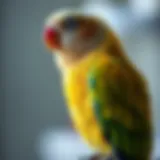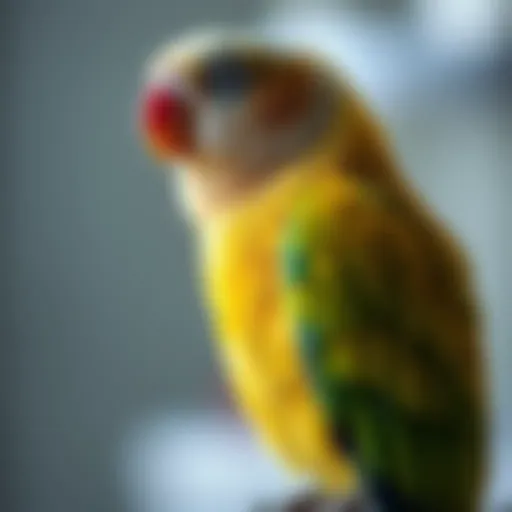The Importance of Board Certified Avian Veterinarians
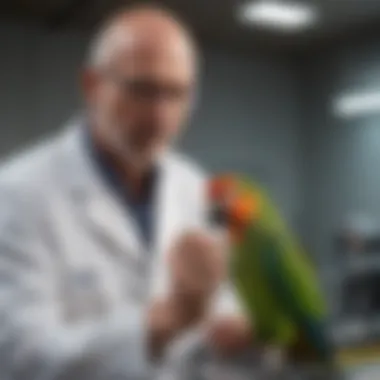

Intro
Bird owners often find themselves enamored with their feathered companions, yet many overlook the specific needs that these extraordinary pets require. Understanding their health care is crucial for fostering a happy and vibrant pet life. This is where board certified avian veterinarians come into play—specialists equipped with the knowledge to handle the intricacies of avian health issues. They are the unsung heroes within the veterinary field, dedicated to the well-being of not just pet birds, but also birds of prey and exotic species.
The journey into the realm of avian veterinary care encompasses several layers. From comprehending the unique behaviors and species-specific needs of pet birds to knowing the correct care and maintenance practices, every aspect lays the groundwork for health and happiness among our feathered friends. Moreover, as with any pet, regular checkups, awareness of behavioral cues, and specialized feeding habits contribute to their overall well-being.
In this article, we will navigate through the essential roles that board certified avian vets fulfill. We will examine their specialized training and discuss the significance of their work in diagnosing and treating illnesses that are specific to avian species. Whether you're considering adopting a bird or already have a cherished feathered companion, understanding this field is truly a game changer. Let's dive deeper into this fascinating narrative.
Foreword to Avian Veterinary Medicine
Avian veterinary medicine is a specialized field that focuses on the health and well-being of birds. As pet ownership trends shift, more and more individuals consider feathered companions as part of their families. This trend places greater importance on avian vets, especially those who are board certified. The significance of understanding avian veterinary medicine cannot be overstated. It plays a crucial role in ensuring that avian species receive comprehensive care tailored to their unique biological and behavioral needs.
Birds are remarkably diverse, ranging from small budgerigars to large parrots and exotic species like toucans and cockatoos. Each species comes with its own set of challenges when it comes to health care. Understanding this diversity underlines the necessity for specialized training in vet care. A board certified avian vet brings together both knowledge and practical skills to manage these varying complexities effectively.
Overview of the Discipline
Avian veterinary medicine encompasses a wide array of practices that are critical for maintaining the health of birds. This discipline is not solely about treating illnesses or injuries but also focuses on preventive care. Such preventive measures include routine check-ups, nutritional counseling, and behavioral assessments.
Birds often develop health conditions that can be subtle, making them difficult to detect. Avian vets are trained to spot these issues earlier than a general veterinarian might. For instance, when a conure isn't eating normally, an avian vet can evaluate the situation more effectively than someone with limited bird experience. These pros know how to read bird behavior, which is often a key to diagnosing health problems.
Evolution of Avian Medicine
The field of avian medicine has evolved significantly over the years. In the past, birds often received minimal attention in veterinary practices, and there wasn't much emphasis on their health. Traditionally, it was assumed that birds were simply pets that could thrive without specialized care. However, changes in societal attitudes toward birds, influenced by aviculture and wildlife conservation, have led to a more informed understanding of avian health.
In the late 20th century, strides were taken toward recognizing the unique needs of birds. The formation of organizations dedicated to avian medical practice propelled advancements in this field. These organizations emphasized the importance of continued education and specialized certification, pushing veterinarians to further their knowledge beyond general veterinary practice. In recent years, advancements in technology and new research have altered how avian diseases are diagnosed and treated. Access to imaging techniques and laboratory tests specifically tailored for birds has opened doors previously thought closed.
It's a new dawn for the birds—recognized as companions with distinct health needs, rather than just background noise in our homes.
The growing evidence of the nuanced biology of birds ultimately underscores the necessity for board certified avian vets. The inclusion of avian medicine as a distinct specialty has made it possible to improve the quality of care and ensure that our feathered friends lead healthy lives.
Defining Board Certification
Board certification is a badge of honor, a marker of excellence in the field of avian veterinary medicine. This signifies that a veterinarian has gone above and beyond in their training and experience, committing themselves to the intricate world of bird health. The certification process is not just a formality; it’s an assurance to pet owners that their avian companions are in capable hands.
Understanding what board certification truly means is vital. It reflects not just a level of competence, but also a dedication to lifelong learning and continuous professional development. In a time when every feathered friend deserves the best care, knowing that a veterinarian holds board certification can instill confidence in owners that they’re getting specialized treatment tailored specifically to their birds' needs.
What Board Certification Means
Simply put, board certification indicates that a veterinarian has undergone extensive training and evaluation in avian medicine. This often requires completing a rigorous residency program, which provides them with in-depth knowledge about various species of birds and their specific health needs. It's as if they’ve passed through a crucible—meticulously selected for their skills and expertise, they emerge equipped with the specialized knowledge necessary to tackle both routine and complex avian health issues.
The benefit of board certification isn’t just academic. It translates into practical, real-world advantages for pet owners. For instance, a board certified avian vet is often more adept at diagnosing conditions that may baffling due to a bird's propensity to hide illness. This nuanced insight can lead to quicker and more effective treatment plans.
Accrediting Bodies for Avian Vets
The prestige of board certification in avian medicine primarily stems from recognized accrediting bodies. One of the notable organizations is the American Board of Veterinary Practitioners (ABVP) with a specialty in avian practice. They set a stringent standard for certification, ensuring that only those who truly qualify can claim the title of board certified avian veterinarian.
Additionally, other organizations play a crucial role in advancing the field of avian medicine. The Association of Avian Veterinarians (AAV) is one such group, continuously promoting further education and best practices among veterinary professionals. This goes a long way in establishing a universal standard for care.
In short, these bodies not only enforce the high standards for board certification but also foster a community of professionals who are dedicated to keeping our feathered companions healthy. Owners should be aware of these certifications as they often guarantee a higher level of care, during both routine check-ups and critical scenarios.
"Opting for a board certified avian vet might very well be the best decision a bird owner can make, ensuring the health of their beloved pets."
The assurance that comes with board certification can sometimes make all the difference. With so much at stake, there's no substitute for specialized knowledge when it comes to the care of your birds.
Qualifications of Board Certified Avian Vets
The role of board certified avian veterinarians is increasingly becoming critical in the realm of pet care, particularly for those who share their lives with birds. As intricately designed creatures, birds present unique health challenges that are often overlooked by general veterinarians. Hence, the qualifications of these specialists stand as a beacon of hope for pet owners seeking expert care for their feathered companions. It’s not just about having a passion for birds; it’s about rigorous training and a deep understanding of avian complexities.
Educational Background
First things first: the educational background lays the groundwork for an avian vet’s capabilities. To kick things off, aspiring veterinary professionals usually complete a bachelor’s degree, often in biology or animal science. This foundational step tends to arm students with essential knowledge. It’s akin to building a house without a sturdy base; you wouldn’t want to start off on shaky ground.
Upon finishing their undergraduate studies, they enter a veterinary school accredited by the American Veterinary Medical Association (AVMA). This journey typically spans four years and includes not only classic veterinary courses but also specialized coursework focused on avian species. A thorough understanding of avian physiology, behavior, and diet is critical. As any experienced vet will tell you, "It’s the details that matter most often."
Residency and Training Requirements
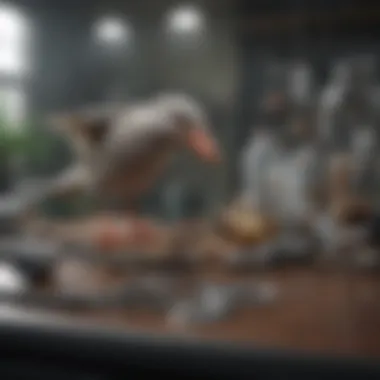

After that challenging academic odyssey, board certification isn’t handed out like candy. An additional step involves completing a residency in avian medicine. This is no walk in the park. Residents work under board-certified avian specialists, diving deep into real-world cases, honing their skills in areas like surgery and diagnostics.
This residency training is typically a minimum of three years, where they grapple with a wide variety of avian health concerns.
"In residency, we don’t just learn about diseases; we learn to think critically and act swiftly, which is crucial for avian care," says Dr. Smith, a board-certified avian vet.
While the academic credentials are significant, it’s this hands-on training that creates capable veterinarians adept at handling urgent cases — from treating metabolic disorders to performing delicate surgical procedures.
The end goal is a comprehensive understanding of avian medicine that transcends basic veterinary knowledge, preparing board certified avian vets to tackle the distinctive health issues that birds face. So, when pet owners are scouting for a vet, understanding the depth of training can make all the difference in ensuring their beloved bird receives capable care.
Importance of Specialized Training
Specialized training for board certified avian vets holds paramount significance in the realm of avian healthcare. Unlike common household pets, birds possess unique anatomical structures and physiological processes that demand tailored knowledge and analytical skills. This training not only equips veterinarians with the expertise to navigate the complexities of avian health but also emphasizes the individuality of various species, ensuring that treatment and care remain effective and appropriate for each bird's specific requirements.
Complexities of Avian Anatomy
Avian anatomy is a marvel on its own, distinguished from mammals through various unique features. Birds are equipped with a skeletal structure that is not only lightweight but also reinforced, allowing them to fly. Their respiratory system is another intricate web, characterized by air sacs that facilitate a continuous flow of oxygen. Understanding these intricacies is not merely academic; it plays a crucial role in ensuring that veterinary interventions are successful.
A qualified avian vet delves into detailed aspects of this anatomy, from the specialized beaks and feet to the varied organ systems. For instance, the digestive system of birds, which includes the gizzard, is completely distinct from that of mammals and has specific health implications.
In practice, these anatomical complexities can translate into diagnostic challenges. An atypical behavior in a bird might point to a certain health issue that would be misread in a different animal. Therefore, an avian vet’s specialized training allows for precision in diagnosing conditions simply not found in other pets.
Species-Specific Health Concerns
Just as the anatomy varies, so too do the health concerns across different species of birds. A board certified avian vet must be conversant with a broad spectrum of species-specific health issues. For example, while cockatiels might be prone to respiratory problems, parrots can often face challenges related to feather plucking or obesity.
Moreover, certain birds may be more susceptible to diseases that could affect others less severely, creating a need for tailored health maintenance strategies.
Here are some common issues related to specific species:
- Seed-eating birds may develop obesity if their diets are not properly monitored.
- Budgerigars are prone to liver issues if not provided a balanced diet rich in greens and fruits.
- Finches often face health issues related to social dynamics; they can be stress-sensitive when housed improperly.
Closure
The specialized training of avian vets fundamentally enhances avian healthcare. It bridges the gap between knowledge of foundational veterinary medicine and the nuances of treating birds. By understanding the complexities of avian anatomy and recognizing species-specific health concerns, these professionals are positioned to provide unparalleled care, safeguarding the health of your feathered friends. Thus, when seeking care for your birds, recognizing the importance of this specialized training can make a significant difference in their overall well-being.
Common Health Issues in Birds
Understanding common health issues in birds is crucial for pet owners and those who work with avian species. Birds are often seen as low-maintenance pets, but they can experience a variety of health challenges that require specialized knowledge and care. Board certified avian vets are equipped to deal with unique physiological and behavioral needs of these creatures, making their role particularly significant in ensuring the well-being of our feathered friends.
Diagnostic Challenges
Diagnosing health problems in birds can be a tricky business. Unlike mammals, birds often hide their ailments until they are quite advanced. This instinct is a survival mechanism, so when they finally show signs of distress, it may already be too late for simple interventions. Symptoms such as changes in appetite, feather appearance, or behavior can indicate serious underlying issues.
Here are a few challenges that board certified avian vets frequently face:
- Vague Symptoms: Birds have a rich palette of behaviors and expressions. Detecting details can be hard. A bird fluffed up, for instance, could be a sign of various issues, from stress to a serious illness like avian influenza.
- Limited Communication: They cannot verbalize their discomfort. While dogs or cats might whimper or meow to signal pain, birds don't have such means. This limitation necessitates a keen observational skill on part of owners and vets alike.
- Species Variation: Different bird species can display different symptoms for the same ailment. Knowing these variances is essential for precise diagnosis.
In many cases, board certified avian vets will use a combination of physical exams, blood tests, and imaging techniques to get to the root of the matter. This thorough approach distinguishes their practice from basic veterinary care, ensuring that every angle is examined.
Preventive Health Care Strategies
A stitch in time saves nine, or so the saying goes. This idiom rings especially true when it comes to avian health care. Prevention is often easier—and cheaper—than treatment. Board certified avian vets employ various strategies to keep birds healthy and alert:
- Regular Check-Ups: Routine examinations can catch living issues before they escalate. Just like people go for annual physicals, birds should have frequent vet visits.
- Vaccination Protocols: Certain vaccines are specifically created for various bird species, protecting them from preventable diseases. For instance, many parrots are vaccinated against polyomavirus, which can be fatal.
- Diet Assessment: A well-balanced diet can prevent numerous problems. Birds often suffer from obesity or malnutrition, so avian vets can help craft suitable meal plans.
- Environmental Enrichment: Boredom is not just a human problem. Birds need stimulation and social interaction to stay healthy. Understanding how to create a stimulating environment can avoid behavioral issues down the line.
Ultimately, preventive health care acts as the first defense against potential diseases. An informed owner who partners with a board certified avian vet can cut down on complications and improve the life quality of their birds.
"An ounce of prevention is worth a pound of cure."
Taking preventive measures is not just about maintaining the health of a bird; it also enriches the relationship between the animal and its owner. Understanding how to recognize and prevent health problems serves both parties well.
Emergency Care and Treatment Protocols
Emergency care in avian medicine is a crucial aspect of ensuring the wellbeing of birds. Unlike other pets, birds can hide their ailments very well, so recognizing an emergency is often not as straightforward. Understanding what constitutes an emergency is the first step for pet owners. It helps them react swiftly, which can mean the difference between life and death for their feathered friends.
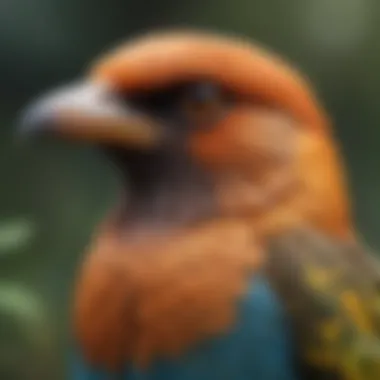

Recognizing Emergencies
Birds are masters at masking their pain. A parakeet that suddenly stops chirping or a cockatoo that won’t engage may be trying to signal distress. Some common signs that can indicate an emergency include:
- Labored Breathing: If your bird is wheezing or struggling visibly to breathe, it’s time to get help.
- Fluffed Feathers: When a bird fluffs up its feathers and seems lethargic, it could be a sign of illness. Birds usually fluff their feathers to conserve heat when they are unwell.
- Changes in Appetite: A drastic change in eating habits may indicate a serious health issue. If your bird refuses to eat for more than a few hours, don’t hesitate to seek veterinary assistance.
- Colder Feet: If you notice that your bird's feet are colder than usual, it could mean they are in shock.
Quick recognition is key. Familiarizing oneself with your bird’s normal behavior can make these signs stand out even more. Evaluating these symptoms with your vet's expertise can streamline the emergency response.
Standard Treatment Procedures
Once an emergency has been identified, various standard treatment procedures come into play.
- First Assessment: The initial step a veterinarian might take is a thorough examination to assess the bird's current state. This includes checking vital signs, hydration levels, and overall responsiveness.
- Stabilization: In critical cases, stabilizing the bird takes precedence. This can involve administering oxygen for respiratory distress or fluids for dehydration.
- Diagnostic Tests: Once stabilized, the vet may do blood tests, X-rays, or other forms of diagnostics to pinpoint the issue more accurately.
- Treatment Plans: Based on the findings, appropriate treatment can be administered. This might include medication, surgical intervention, or other specialized care.
- Post-Care: After treatment, continued monitoring is vital. Follow-up visits may be necessary to ensure recovery.
Remember: Immediate action can propel outcomes to the positive side when emergencies arise. Knowing local avian vets and their emergency protocols is a great first step to take as a responsible bird owner.
Behavioral Assessment and Modification
Behavioral assessment and modification play a crucial role in avian veterinary practice. Understanding how birds behave is not just about observing them; it's about deciphering their underlying emotions and mental states. The importance of this process cannot be overstated, especially in fostering human-bird relationships that benefit both owners and their feathered companions.
Understanding Avian Behavior
Birds, like all animals, exhibit behaviors that reflect their needs, desires, and discomforts. A board certified avian vet is trained to interpret these subtle cues—things like feather plucking, vocalization patterns, or changes in activity levels can hint at underlying stress or health concerns.
It’s fascinating how avian behavior varies widely across different species. For example, parakeets may engage in playful chirping when happy, while cockatoos often flaunt exaggerated movements when excited. Recognizing these behaviors allows pet owners to better cater to their birds' environments and emotional needs.
A few key aspects of avian behavior include:
- Social Structure: Birds are naturally social creatures. For many pet species, isolation can lead to anxiety or depression.
- Territoriality: Birds often have strong attachments to their living spaces. Understanding their territorial instincts helps owners create a harmonious home environment.
- Communication: Vocalizations and body language are major tools for birds. Understanding their language is vital for effective interaction.
Strategies for Behavioral Issues
When behavioral issues arise, the path taken to address them can be as individual as the birds themselves. Board certified avian vets employ various strategies to manage and treat these behaviors, which can be categorized as follows:
- Environmental Enrichment: An enriched environment filled with toys, perches, and social interactions can significantly improve a bird's wellbeing. Keeping boredom at bay is essential for mental health.
- Routine and Consistency: Birds thrive on predictability. Establishing a daily routine can provide comfort and stability, reducing anxiety that may stem from sudden changes.
- Positive Reinforcement: Rewarding desirable behavior with treats or praise helps reinforce positive actions. This method fosters trust and encourages good behavior without resorting to aversive techniques.
- Regular Vet Visits: Regular check-ups with a vet familiar with avian behavior can pinpoint health issues that may be contributing to behavioral problems.
"Recognizing and responding to avian behavior is like solving a puzzle. Every bird has a unique piece that contributes to their overall picture of health and happiness."
The emphasis here is on proactive engagement. By implementing behavioral strategies early on, pet owners can prevent the escalation of issues that might otherwise require more intensive interventions. Not only does this ensure the bird's well-being, it cultivates an enriching environment for both the bird and its owner.
The Role of Board Certified Avian Vets in Conservation
Board certified avian veterinarians play a critical role in conservation efforts, serving not only as caregivers for individual birds but also as advocates for the health of entire species. Their specialized training and qualifications uniquely position them to address the complex challenges associated with avian health and conservation. This significance is profound and reflects in many aspects of their work.
Contribution to Species Preservation
The preservation of species hinges on a multifaceted approach, and board certified avian vets are essential players in this arena. They contribute to species preservation through various means:
- Medical Care for Endangered Species: These vets often provide medical aid to endangered birds, facilitating recovery and rehabilitation. As an example, working with organizations like the International Bird Rescue allows them to apply their skills directly to species that are on the brink of extinction.
- Research and Data Collection: By conducting studies related to avian health, these veterinarians gather insights that inform conservation strategies. This research is crucial, as it helps conservationists understand how diseases spread among populations, or how habitat loss impacts bird health.
- Captive Breeding Programs: Board certified avian vets often oversee breeding programs designed to reintroduce species into the wild. Their knowledge contributes to the genetic diversity of these programs, ensuring that reintroduced populations are strong and viable.
- Involvement with NGOs: Many of these professionals partner with non-governmental organizations dedicated to conservation. They lend expertise that can shape policies and funding towards avian species.
Notably, their role extends beyond direct interaction with birds. These vets often collaborate with various stakeholders to promote health initiatives that greatly enhance survival rates in the wild.
Community Education Initiatives
Education lies at the heart of effective conservation, and board certified avian vets actively engage in community outreach. They work to educate pet owners, schools, and the public about the importance of avian biodiversity and conservation efforts:
- Workshops and Seminars: Many vets organize local workshops where community members can learn about bird care, the symptoms of common ailments, and ways to create supportive environments for wild species.
- Educational Materials: Producing informative materials, such as pamphlets or online resources, helps spread awareness about specific avian issues such as habitat destruction and the effects of climate change on bird populations.
- School Programs: Engaging with schools to nurture interest in birds among young people can sow the seeds for future conservationists. Through presentations and hands-on activities, these professionals can inspire the next generation.
- Social Media Campaigns: With the world of technology at our fingertips, board certified avian vets are savvy in utilizing social media platforms. They use these spaces to share knowledge, promote awareness campaigns, and disseminate research findings.
"Education is the cornerstone of environmental stewardship. By instilling knowledge, we empower the community to actively participate in conservation efforts."
These community education initiatives not only raise awareness but help build a connection between people and birds, fostering an environment where conservation becomes a shared responsibility.
In summary, the role of board certified avian veterinarians in conservation encapsulates both direct medical interventions for species in need and broad educational outreach that cultivates a society more conscious of avian welfare. Their unique blend of skills and knowledge creates a robust framework for protecting the diverse bird populations that share our planet.
Finding a Qualified Avian Vet
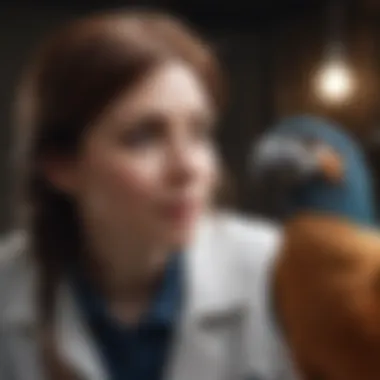

Finding a qualified avian veterinarian is not just about choosing someone who’s merely trained in animal care. It’s about ensuring that your feathered companion receives the specialized attention they deserve. Birds, with their unique physiology and diverse behavioral patterns, require a unique approach when it comes to health care.
The role of a board certified avian vet stretches beyond the basic check-ups; it’s about understanding the intricate details that pertain to avian species. Specialized avian care is crucial in identifying and managing health issues that other vets, perhaps without a focused background, may overlook.
When pet owners seek out an avian veterinarian, they should consider key aspects: expertise in avian species, familiarity with the specific needs of the bird, and a commitment to continuing education. Finding such a professional can lead to several benefits, including:
- Tailored Treatment Plans: Board certified vets utilize their comprehensive understanding of different bird species and their quirks to create individual health strategies that suit your pet.
- Accurate Diagnosis: Their specialized training enables them to run the right tests and interpret results correctly, catching issues early.
- Preventative Care: They often provide lifestyle advice tailored to the specific needs of your bird, including dietary recommendations, socialization strategies, and habitat enrichment.
Resources for Owners
Several resources can assist pet owners in locating qualified avian veterinarians. Owners may want to consider:
- Referrals from Other Bird Owners: Word of mouth from fellow bird enthusiasts can be invaluable. Engaging with local bird clubs or online forums like reddit.com can yield reliable recommendations.
- Professional Associations: Organizations such as the Association of Avian Veterinarians offer searchable directories of certified avian vets. They ensure that listed vets maintain certain standards of practice.
- Online Reviews and Testimonials: Checking community feedback on vet practices can provide insight into their successes and range of services.
Ensuring Comprehensive Care
Once a qualified avian vet has been located, ensuring comprehensive care for your bird involves more than just regular check-ups. Effective communication between you and your veterinarian is key in monitoring health and wellness. Here are a few pointers:
- Regular Health Check-ups: Routine veterinary visits should be scheduled to monitor your bird’s health. These check-ups often reveal underlying issues that may not be visibly apparent.
- Open Dialogue: Foster a relationship where you can openly discuss any changes in behavior or diet. Keeping a journal of your bird’s habits might help note down anything unusual for discussion during appointments.
- Education on Avian Health: Enlightening yourself about common avian health problems can improve your ability to spot potentially troubling signs, prompting you to seek help sooner.
"A proactive pet owner leads to a healthier and happier bird."
A board certified avian vet serves as a partner in your bird’s life. Together, you can create an environment that minimizes health risks and maximizes the vibrant potential of your pet. Remember, a little diligence in finding the right vet can translate to a world of difference for your feathery friend.
Future Trends in Avian Veterinary Medicine
Future trends in avian veterinary medicine are more than just a passing phase; they reflect the ongoing evolution of animal care and the growing demand for specialized services. As we dive into this realm, it's clear that these trends hold substantial promise for both veterinary professionals and pet owners alike. Key elements such as technological advancements and evolving practices are set to reshape how we approach avian health care, ensuring that our feathered friends receive the best treatment possible.
Technological Advancements
Technological advancements have always played a significant role in veterinary medicine, but their impact on avian care is particularly noteworthy. For instance, the adoption of telemedicine allows for remote consultations, enabling avian vets to reach pet owners who may not have easy access to specialized care. This service can be advantageous, especially in regions where avian vets are few and far between.
Moreover, advancements in diagnostic tools, such as digital imaging and specialized laboratory equipment, make it easier to identify health issues in birds—often at earlier stages than traditional methods could allow. Technologies like PCR (polymerase chain reaction) testing help in detecting infectious diseases more rapidly and accurately. Such prompt diagnostics improve treatment outcomes, ultimately benefiting the animals’ health.
- Ease of Access: Telemedicine enhances owner accessibility to expert advice.
- Precision Diagnostics: Specialized equipment leads to quicker, more accurate diagnoses.
- Better Treatments: Advancements translate into higher success rates in treatment protocols.
"The future of avian veterinary medicine hinges on integrating technology to enhance the care we provide to our feathered companions."
Evolving Practices in Avian Care
As the field of avian veterinary medicine expands, so too do the practices and methodologies involved in caring for birds. One significant change is the increasing emphasis on preventative care. Pet owners are becoming more aware of the benefits of routine health check-ups, vaccinations, and screenings to detect potential problems before they escalate. Vets are prioritizing education for pet owners, promoting the importance of maintenance and upkeep for optimal health.
Additionally, behavioral health is gaining traction in avian care philosophies. Understanding the social nature and environmental needs of birds allows vets to provide more tailored recommendations for care. For example, recognizing stress triggers in a particular species can lead to modifications in diet, habitat, or social structure.
Among various evolving practices, these stand out:
- Preventative Health Focus: Routine check-ups are being integrated more universally into avian care strategies.
- Holistic Approaches: Vets now consider physical, mental, and environmental factors in their assessments, leading to more comprehensive care.
- Pet Owner Education: Vets are dedicated to empowering owners with knowledge about their pet's needs.
These evolving practices underscore a pivotal shift towards more proactive and informed avian care. Such trends emphasize the importance of seeing board certified avian vets as partners in ensuring the well-being of our winged companions.
Ending: The Impact of Specialized Avian Care
Specialized avian care holds tremendous importance in the realm of veterinary medicine. Board certified avian veterinarians, with their extensive training and knowledge, are critical in elevating the standards of care for birds. These professionals are not merely veterinary practitioners; their expertise often makes the difference between life and death for numerous species. Avian health is not just a specialty; it is a complex interplay of environmental factors, behavioral assessments, and medical interventions.
Through this article, we've elucidated how avian veterinarians contribute significantly to the overall health and well-being of pet birds. Their unique understanding of avian anatomy and the specific health challenges that birds face is unmatched. By focusing on their specialized training, these veterinarians become equipped to address a broad spectrum of issues that impact avian health, ranging from preventive measures to emergency care. It’s a field that demands ongoing education and adaptation to emerging trends, ensuring that avian patients receive the finest care possible.
"The best path to avian health is paved with specialized knowledge and vigilant care."
Many pet owners may underestimate the need for specialized avian care, believing that any veterinarian can handle bird ailments. However, this mindset can lead to inadequate treatment and prolonged suffering for the pet. It’s crucial for bird owners to recognize the skill set possessed by board certified avian vets, and how it translates into a healthier, happier life for their feathered companions.
Summarizing Key Points
- Importance of Specialist Knowledge: Board certified avian vets undergo rigorous training to understand the intricacies of avian biology, behavior, and diseases.
- Tailored Care Approach: The strategies they employ are often tailored to specific species and individual circumstances, considering each bird's needs.
- Holistic Health Monitoring: These vets don’t just treat ailments but also promote wellness through preventive care, thus safeguarding the long-term health of birds.
Encouraging Pet Owner Awareness
One cannot stress enough the importance of raising awareness about avian health among pet owners. It's vital for them to actively seek out board certified avian veterinarians. Here are several ways to encourage this:
- Educate the Public: Share information through social media platforms, community newsletters, or bird-related organizations about the benefits of specialized care for birds.
- Utilize Visuals: Create infographics showcasing the common health issues that benefit from specialized vet care, ensuring pet owners grasp the gravity of the situation.
- Establish Local Networks: Begin local groups that connect bird owners with avian professionals in the area, making it easier for individuals to reach out when they require assistance.
Raising awareness and encouraging thorough exploration of care options is fundamental. Board certified avian veterinarians are indispensable allies in the journey towards improved avian health, and pet owners need to engage with these professionals to ensure their companions lead vibrant, fulfilling lives.




